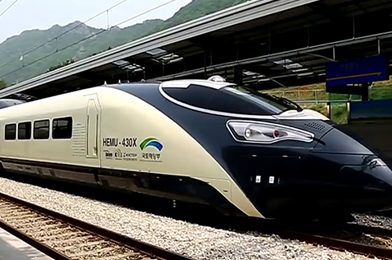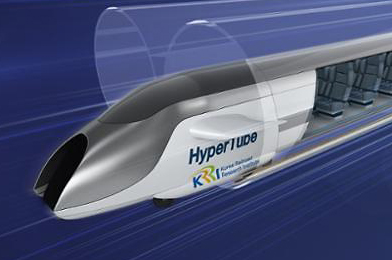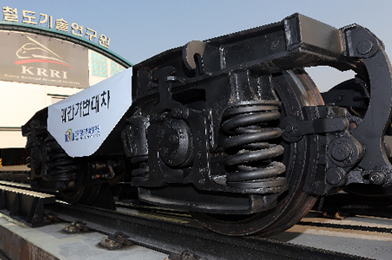RESEARCH PROJECT
-

- Maximum speed : 430 km/h
- Capacity : 456 passengers / train set
- High efficiency induction motor
- Light weight aluminum extruded carbody
-

- 1/1,000 low-pressure, near-vacuum aerodynamics and sealed tube technology
- Electromagnetic levitation technology with freezer separated high temperature superconductor
-

- Y25 (intergrated welding) gauge changing bogie
- Rail gauge : 1,435mm (standard gauge), 1,520mm (broad gauge)
- Maximum speed : 120km/h
- Diameter : 860mm
- Distance between wheels: 1,800mm
KRRI NEWS
UIWANG, South Korea – December 23 – The Korea Railroad Research Institute (KRRI) (President: Sagong Myung) has developed an “EPDM Pad Sleeper,” which mitigates train-induced impact on ballasted tracks, extends maintenance intervals, and reduces the required ballast layer thickness. Following field performance testing on the Gyeongbu Line, the technology successfully passed the Korea National Railway’s KR railway facility performance verification.* EPDM (Ethylene Propylene Diene Monomer): A highly durable synthetic rubberThe EPDM pad sleeper affixes an embedded synthetic rubber pad (6 mm thick) to the bottom surface of a concrete sleeper, reducing pressure transmission to the ballast layer (trackbed*) by 20–30%. This reduces ballast wear and breakage, thereby lowering maintenance work and associated costs.* Trackbed: The ballast layer laid beneath railway tracksThis technology was developed to reduce labor and maintenance costs associated with ballasted track maintenance. It is drawing particular attention as an efficient alternative for lines such as the first phase of the Gyeongbu High-Speed Railway, where scheduled maintenance cycles for ballasted tracks are approaching.By maintaining ballast quality in good condition for extended periods, the technology reduces the frequency of ballasted track maintenance. Beyond ballast preservation, it also mitigates deterioration of other track components such as rails and sleepers, thereby extending their service life.KRRI developed two types of EPDM pad sleepers for ballasted tracks—high-stiffness and medium-stiffness—and completed structural reviews through numerical analysis, full-scale testing, and field tests (Osong Test Line, Gyeongbu Line).Structural stability assessments and field test results confirmed safe train operation under conditions including KTX operation at speeds of 250 km/h and heavy-load freight train operation.In addition, through impact load tests, full-scale tests reproducing train dynamic loads*, and long-term field installation tests at the Osong Test Line over a period of four years and six months, KRRI verified that the application of pad sleepers reduces ballast breakage, increases lateral ballast resistance, and lowers ballast pressure, thereby confirming train operation safety of EPDM pad sleepers.* Dynamic load: Impact force applied during movementIn October 2023, KRRI conducted field installation tests on the operating section between Jeondong and Seochang stations on the Gyeongbu Line (located in Sejong City). After more than two years and one month of operation, both safe train operation and improved pad performance have been confirmed throughout the entire section equipped with pad sleepers. Based on these verification results, the EPDM pad sleeper technology passed the Korea National Railway's railway facility performance verification in July this year.This technology was developed through KRRI’s basic research program under the National Research Council of Science & Technology (NST) (Chairman: Kim Young-sik), titled “Development of Long-Life Ballasted Track Technology Using EPDM Pad Sleepers.”Principal Researcher Kim Dae-sang at KRRI said, “The EPDM pad sleeper is a cost-effective technology that reduces the maintenance burden of conventional ballasted tracks. Based on the performance verified through field validation, we will further specify the commercialization stage.”President Sagong Myung of KRRI stated, “This research represents an achievement that enhances train operation safety while contributing to environmentally friendly railway operations. We will continue to take the lead in developing practical, field-oriented technologies with sustainability in mind.”Press ContactsSunghyun BaekKorea Railroad Research Institutebaeksh@krri.re.kr+82 31 460 5162
- Integrated Equipment for Railway Wheel Wear Measurement Developed, with Field Demonstration Completed at Rolling Stock Depots -UIWANG, South Korea – December 22 – The Korea Railroad Research Institute (KRRI) (President: Sagong Myung) has developed “METLOBSE,” an automated system that measures railway wheel wear and surface roughness* to prevent train derailments. The institute completed field demonstrations at Incheon Transit Corporation’s Unyeon Rolling Stock Depot (December 9) and Busan Transportation Corporation’s Nopo Rolling Stock Depot (December 17).* Roughness: The degree of surface irregularity of train wheelsMETLOBSE” is an automated mobile railway wheel measurement system developed by KRRI. The system integrates the measurement of wheel wear profiles, surface roughness management, and wheel diameter for train wheels while stationary in inspection sheds at rolling stock depots, all in a fully automated process.The system consolidates multiple separate devices that were previously used for railway wheel inspections into a single integrated platform. By enhancing compatibility with on-site maintenance history management systems, the system improves the efficiency of routine wheel inspections and contributes to maintenance optimization and accident prevention.Flange* wear and wheel diameter management are essential maintenance items for railway operators and are currently measured and managed using overseas equipment. Once METLOBSE is developed into a mass-production automated system, it is expected to achieve domestic replacement of imported equipment while simultaneously improving measurement accuracy and operational efficiency.* Flange: The protruding edge of a railway wheel that enables trains to run without derailmentKRRI jointly developed this technology with LOBSE Co., Ltd. (CEO: Lee Eung-seok), Incheon Transit Corporation, and Busan Transportation Corporation and completed performance verification through field demonstrations at operating depots in Incheon and Busan.KRRI completed technology transfer to LOBSE Co., Ltd. this year and plans to expand field applications and advance commercialization next year. This research was conducted as part of the Disaster Safety Industry Technology Commercialization Support Program of the Ministry of the Interior and Safety.※ Relevant Research ProjectProject Title: Development of a Railway Derailment Prevention System through Wheel Roughness Measurement and ManagementResearch Period: April 1, 2024 ~ December 31, 2025Research Institution (Principal Investigator): Korea Railroad Research Institute (Principal Researcher Jeong Woo-tae)Principal Researcher Jeong Woo-tae at KRRI, said, “The developed wheel wear and roughness measurement system (METLOBSE) enables the establishment of an automated system that can replace manual routine inspection tasks performed by on-site railway workers. We plan to continuously enhance the completeness of this research by linking it with maintenance history management systems and artificial intelligence detection technologies.”President Sagong Myung of KRRI said, “This represents an innovative research achievement that significantly improves the accuracy and efficiency of wheel inspections to prevent derailment risks. We remain committed to developing safety and preventive technologies so that the public can use railways with confidence.”※Reference: Photo of METLOBSE, the Railway Wheel Wear Measurement SystemPress ContactsSunghyun BaekKorea Railroad Research Institutebaeksh@krri.re.kr+82 31 460 5162
Korea Railroad
Research Institute

